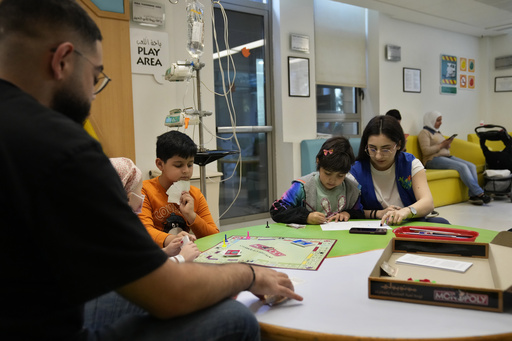
BEIRUT — In the bustling corridors of Beirut’s children’s cancer treatment facility, 9-year-old Carol Zeghayer clutched her IV while eagerly searching for her friends from the oncology ward. Diagnosed with cancer just before the violent conflict involving Hezbollah and Israel escalated in October 2023, Carol depends on her weekly visits to this center for ongoing medical care.
However, the journey that once took her family about 90 minutes has now extended to up to three hours, as they navigate treacherous and heavily bombarded mountainous paths in South Lebanon. Even during these trips, the threat of Israeli airstrikes looms, adding to the stress of families already dealing with serious health issues. “She’s just a child. When they strike, she asks me, ‘Mama, was that far?’” lamented her mother, Sindus Hamra.
The family resides in Hasbaya, a region in southeastern Lebanon, where the sounds of airstrikes have become an unsettling part of their daily routine. Just a short distance from their home, in the neighboring town of Khiam, Israeli forces and Hezbollah militants are engaged in continuous clashes. During a recent drive to Beirut for treatment, the family experienced the thunderous roar of a rocket followed by its explosive impact as they departed.
Despite rising hopes of a ceasefire in recent days, the bombardment continues relentlessly, heightening Hamra’s concern that her daughter might miss essential chemotherapy sessions. “Her situation is very tricky — her cancer can spread to her head,” she said, visibly upset as she described Carol’s diagnosis of both lymph node cancer and leukemia. To date, Carol has completed one-third of her treatment, with many challenging months ahead.
As Carol’s family clings to their home, countless others in Lebanon have been forced to flee due to the increased intensity of Israeli bombardments that began in late September. Many families displaced include those with children battling cancer, prompting the Children’s Cancer Center of Lebanon to quickly assess each patient’s situation to maintain their treatments, sometimes relocating them to hospitals closer to their new homes, according to Zeina El Chami, the center’s fundraising and events executive.
During the initial days of conflict escalation, the center took in patients who required emergency care, providing them shelter as circumstances made returning home unsafe. “They had no place to go,” recalled pediatric hematologist Dolly Noun. “Some were even admitted for panic attacks. It has not been easy.”
The ongoing war has exacerbated the challenges faced by young patients. Many medical professionals have been displaced, and some have gone weeks without seeing family members due to perilous travel conditions. The combined crises affecting Lebanon since 2019—an economic collapse, the tragic Beirut port explosion in 2020, and now ceaseless warfare—have placed immense strain on healthcare institutions like the cancer center, struggling to secure the funds necessary to care for their patients.
“Cancer waits for no one,” Chami emphasized, noting that recent crises have severely limited the center’s ability to organize fundraising events, resulting in an urgent need for donations. Currently, the facility is treating over 400 patients, ranging from newborns to 18-year-olds, accounting for approximately 60% of Lebanon’s pediatric cancer cases.
For Carol, conversations about the war often arise with her friends at the center, where she shares her experiences of listening to explosions and feeling the impact at home. In contrast, for many young patients, the playroom at the center provides a fleeting respite from the grim occurrences outside. Eight-year-old Mohammad Mousawi was found joyfully running around the playroom, engrossed in his game to hide objects for his friend to discover as his nurse called him for his chemotherapy appointment.
His family originally resided in Ghobeiry, a southern Beirut neighborhood, marked for demolition in an Israeli evacuation alert weeks earlier. “But till now, they haven’t struck it,” his mother, Suzan Mousawi, observed. “They have hit buildings around it — two behind it and two in front.”
The Mousawis have shifted residence three times, initially to a mountainous area; however, the winter cold posed severe risks to Mohammad’s weakened immune system. They eventually found temporary refuge in Ain el-Rummaneh, yet the ongoing bombardments still threaten their safety. “All our memories are gone,” Suzan lamented, recalling their life in Dahiyeh, a significant area for their family.
With 15 weeks of treatment remaining for Mohammad, the family remains hopeful for his recovery while grappling with the impact of the war on their life plans. “When Mohammad fell ill, we bought a house,” she reminisced. The modest home, along with toys and aspirations for a brighter future, now feels precarious amid the ongoing conflict.
Some families, however, are all too familiar with such violence. Nine-year-old Asinat Al Lahham, a cancer center patient, hails from a refugee family that fled Syria only to find themselves caught in yet another war. “We escaped one war to another,” her mother Fatima lamented. On a recent car ride back from chemotherapy, Asinat’s father arrived home during an airstrike and tried to calm his daughter with loud music to drown out the chaos outside.
As Asinat sat connected to an IV drip in the medical ward, she negotiated with her doctor for a small allowance of flavoring for her instant noodles. “I don’t feel safe … nowhere is safe … not Lebanon, not Syria, not Palestine,” she voiced honestly. But despite the terror, the simple comfort of noodles brought a smile to her face.
With returning to Syria not an option, Asinat’s family confronts the stark reality of being trapped in a warzone while undergoing treatment for her illness. “We can’t leave here,” Fatima expressed. “This war, her illness … it’s like there’s no escape.”
